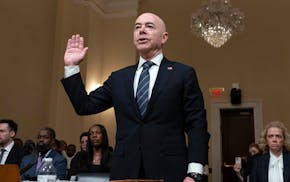Nicholas Clegg, the surprising rising star of British politics, laid some of the groundwork for his career in the year he spent at the University of Minnesota two decades ago.
"He was very personable, smart and articulate," said Kathryn Sikkink, a political science professor who taught Clegg in a graduate seminar. "I'm not surprised he's done well, but this was not a guy you thought was going to some day be the prime minister of Great Britain."
Clegg, the leader of the usually also-ran Liberal Democrats, has sent a shockwave through the campaign for prime minister, which will culminate in an election in two weeks.
Fueled by a strong performance in Britain's first-ever televised campaign debate, Clegg has vaulted in the polls, actually leading a couple. Described as his party's "pin-up boy," he has several times been called the Barack Obama of British politics.
After attending Cambridge as an undergraduate, he spent the 1989-90 academic year at the University of Minnesota, studying politics and international relations, Sikkink's specialty.
He stood out in a graduate seminar that focused on human rights, she said.
"Of course I remembered him clearly, but I'd forgotten how well he did in class," Sikkink said. "When I went back and looked, I saw he got the highest grade in the class -- and he was a master's student with others who were mainly PhD students."
He wrote his master's thesis on "The Deep Green Movement and its Political Philosophy."
After he left Minnesota, Clegg moved to New York, where he worked as a fact-checker for essayist Christopher Hitchens.
On his Facebook page, Clegg's Minnesota stint is mentioned as one of "25 random things about Nick Clegg."
In interviews, he also has spoken about a road trip he took across America with friends, conveying a genuine affection for the country.
On the campaign trail he has argued that the British-U.S. "special relationship" is outdated and is more Eurocentric than most mainstream British politicians.
"It was clear he was someone who was knowledgeable about the world, but he spent enough time in the United States to be familiar with it," Sikkink said.
She remembers him as "well-liked among the other graduate students and seemed like he was having a good time when he was here."
New Black congressional district in Louisiana bows to politics, not race, backers say
Trump trial jury selection process follows a familiar pattern with an unpredictable outcome
Climate change concerns grow, but few think Biden's climate law will help, AP-NORC poll finds
